- Home
- Gary Corby
Death on Delos Page 2
Death on Delos Read online
Page 2
“Those ships are nothing to do with me or my sacred task,” Diotima said flatly.
Anaxinos didn’t seem to notice my wife’s tone. “This is the first time in many years that I have seen so many warships off our island. Not even for meetings of the League do we see so much power assembled. Is Athens at war with someone? Where are they headed?”
The Athenian fleet chose that moment to land. There was only one pier, but that didn’t matter; triremes are designed to be beached wherever the crew can find enough sand. The ships slid onto the beach as they are designed to do. Their crews jumped over the sides to secure the boats with long ropes. This continued all along the sandy coast.
“What in Hades do they think they’re doing?” Anaxinos said. He sounded more incredulous than worried.
One boat didn’t beach like the others. It glided up to the other side of the pier at which Paralos had docked. I happened to know the name of that trireme: Harpy. Paralos and Harpy faced those of us on land, side by side, with only the narrow wooden pier to separate them. Their battering ram prows pointed straight at us.
A man stepped off the new arrival. It was Pericles. He had carefully eschewed anything that smacked of the military. He wore no armor, but was dressed as formally as the High Priest, though the color of his clothing was more somber, the grays and reds of a man on a state mission. The chiton that Pericles wore covered him from ankles to wrists; across his shoulders he wore a himation of finest linen (his usual woolen one would have been far too hot in this weather); upon his head was a wide-brimmed hat that might have been for shade, but which I knew he wore to conceal his oddly elongated head. Pericles had always been sensitive about the shape of his head.
“Pericles?” Anaxinos said in astonishment.
Pericles took the High Priest’s hands in his own, clasped them warmly and said, “Anaxinos, High Priest of Delos, I greet you. You are looking well.”
Pericles’s voice was pleasant, and rich in timbre. Pericles’s voice was as famous as the man himself. There were those who said the secret of his success was his ability to enchant anyone who heard him speak.
It was apparent that these two already knew each other, which on reflection was no surprise. Pericles and Anaxinos must have sat together at meetings of the League.
“I rejoice to see you, Pericles, as always,” Anaxinos said, though his manner betrayed his confusion. “But what are you doing here?”
“A difficult situation has arisen, my friend,” Pericles said. Then he delivered the news that had shaken all of Athens, when word had arrived from the south not ten days before. “I regret to tell you that the Persians have retaken Egypt.”
“So we had heard, even here on isolated Delos,” Anaxinos said. “Do you go to fight the enemy?”
“They are too strong,” Pericles said. “So much so that we fear the opposite. The Persians could assemble a powerful fleet and attack the southern islands of the Delian League.”
“Which includes Delos itself,” Anaxinos said. He rubbed his chin in thought. “So you have come to protect the Holy Isle.”
“In a manner of speaking,” Pericles said smoothly. “In order to protect the members of the League we must have ships, and armaments for fighting men. We must have shield factories and shipyards.”
“Yes, of course,” said Anaxinos. “That is why we in the sanctuary maintain the treasury of the League, to pay for these things.”
“Yet here on Delos, the treasury is exposed. Think upon it, Anaxinos,” Pericles said. “The Persians could send a fleet to sack Delos and steal the treasury. The danger to your people is great, the danger to the funds even greater. So it is that we have come to remove the treasury of the Delian League,” Pericles said. “We’re taking it with us back to Athens.”
The priests and priestesses who heard these words exclaimed in horror. Anaxinos turned white, despite the sun. For a moment I thought he would faint. But he didn’t. Instead he said, “You cannot!”
“I must insist,” Pericles said.
“Have you discussed this with the other member states?” Anaxinos demanded.
“The need is urgent. The time required to confer is too great,” Pericles said. “I’m sure you can see that. We must act.”
The other priests and priestesses were glancing at each other in dismay. The priest in gray shook his staff.
“Then we must resist you,” Anaxinos said.
“Resist?” Pericles said. He sounded surprised, and there was a shade of hurt in his voice. “My dear Anaxinos, this highly esteemed Sanctuary of Apollo has been an excellent custodian of the League funds, but a custodian only. The time has come for another to bear the burden.”
Anaxinos looked uncertain.
“It is the safety of Delos that concerns us,” Pericles said, pressing his advantage. “While the League treasury resides here, it is a temptation to any force strong enough to attack.”
Anaxinos reluctantly nodded at these true words. He opened his mouth to speak.
But now the man in the gray robe stepped forward. He flung back his hood to reveal a short, grizzled beard, bright, angry eyes, and a stern, disapproving mouth. He beat his staff upon the ground until he had everyone’s attention.
“I am Geros, the oldest priest, most versed in knowledge of the Gods, and the final authority on matters of temple doctrine, and I say that you cannot do this thing.”
“Why is that, sir?” Pericles asked. I knew Pericles had a poor opinion of self-proclaimed experts, but he made an effort to keep his voice polite.
“Because it is heresy!” The old priest shook his staff in anger. “There is no greater crime than to remove treasure from a sanctuary. This all men know.”
“And if the Persians attack you, as I fear?” Pericles asked.
“Then Divine Apollo shall protect us, as he always has,” Geros said.
Personally I had more faith in Pericles’s fifty triremes, but it would have been in bad taste to say so to the ancient priest.
Geros raised his staff and pointed it straight at Pericles. “Depart this place, before you do more harm.”
“What harm?” Pericles demanded.
“When you come with such thoughts, you pollute the sanctuary by your very presence. I say to you, depart.”
At these words several of the priests and priestesses shook their fists.
At that same moment, the sailors from Paralos walked past, carrying the sumptuous supply of food for the island.
“Shall we take with us the gifts and the food, too?” Pericles asked. “I remind you that for a century or more now, it is Athens that has supported Delos with our food and our gifts.”
“So now you threaten to starve us?” Geros accused.
“I never said any such thing!” Now Pericles was losing his temper.
“Gentlemen!” said Anaxinos. He held up his hands to stop the argument. “Let there be peace here. We are all men of good will.” He turned to the elder priest. “Geros, I am sure that Pericles has our welfare at heart.”
Geros looked like he doubted that very much. He said nothing but, “Hmmpf.”
Anaxinos then turned to Pericles. “Pericles, you must understand that what you propose is contrary to twenty-five years of custom, and that your actions are arbitrary and unexpected. But I have thought about it as you spoke, and there is a path forward. I shall announce a full meeting of the Delian League. Every member is to vote. If the member states agree, then you shall have the treasury.”
That seemed fair. The priests and priestesses nodded.
“And how long will that take?” Pericles objected. “There are one hundred and forty-eight member states!”
“A matter of mere days if they travel with all speed—as you know perfectly well—and when the other cities learn what you’re up to I’m sure they will make great haste to be here.”
“Days
to arrive, perhaps,” Pericles said, “followed by months of endless wrangling. You know how these meetings go, Anaxinos. Men talk and talk, and in the end do nothing. What if the Persians attack in the meantime?”
“With your fifty triremes on station?” Anaxinos scoffed.
“I’m glad you mentioned that,” Pericles said. He seemed to have regained his self-control. He sounded icy calm. “I point out that you are a village of priests. Whereas we are a fleet stronger than any other. I think that Delos must be sensible about this.”
Everyone present gasped. That was an open threat, laid bare for all to hear. Athens had the power to take this money, so Athens would take it.
This encounter hadn’t gone quite the way Pericles had promised me. Back in Athens, when he had told me of his plan, he had assured me that he would persuade the priests of Apollo.
“I will bring them to see reason. They are but priests, and I am the greatest orator in the world,” Pericles had said with a complete lack of modesty but a good deal of truth.
Anaxinos, however, had a ready answer to Pericles’s rhetoric. The High Priest, who had seemed such a nice man, punched Pericles in the face.
The Standoff
“Are they still rioting?” Diotima asked from the comfort of her bed. Her voice was tired, cold, and unforgiving.
It had been an easy pregnancy for the first ten months, the only problem being that Diotima had became increasingly and uncharacteristically irritable as the day of birth approached. Yet a wise man doesn’t argue with a woman in her condition. Instead he ignores the irritation and looks after the mother-to-be.
I peered out from behind the curtains of the cottage we had been given to use. The cottage was a simple, one room affair with bed, chairs, and a table; but it had pretty appointments, such as the cushions on the chairs, and the curtains that covered the wooden shutters. The shutters and the door all squealed when you moved them—it seemed every hinge needed a touch of oil—but it was otherwise the perfect small home.
In the distance I could see fires burning and hear voices singing.
“It seems to be a standoff,” I said.
As word of the Athenian invasion had spread, the priests and priestesses had come from all over the island to surround the treasury houses. Each treasury was a small building, all clustered together within the sacred precinct. At first there had been scuffles. I had decided my pregnant wife was not going to be caught up in a major fight—a fight which at that time seemed imminent—so, guided by one of the priestesses, I had escorted Diotima to the pretty house in the village where we were to live. There we waited throughout what was left of the afternoon to see what would happen next.
Meanwhile the people of Delos had sat themselves down in front of the treasury doors. As night fell they built bonfires. The people linked arms and sang songs of defiance and hymns to Apollo and Artemis.
The Athenian soldiers and sailors could do nothing but watch this display. The only alternative would have been to drag away holy people. Not even the most cynical Athenian was going to do that. The soldiers nevertheless tried to look useful by standing in a thin battle line, facing the singing priests. It was a complete waste of time because there was no enemy to fight.
This news and other updates we learned from the small stream of priestesses who returned to the village to collect food and water for the protestors. With the threat of open warfare over, Diotima and I wanted to return to the scene. But we couldn’t stand with the people of Delos—we were Athenians, after all, and the locals would be wary of us—nor could we stand with the soldiers and sailors. Diotima and I were here to honor the Gods, like the people of Delos, not to deplete the treasury of Apollo. Thus we were neither one side nor the other. If we turned up to watch the excitement, then where we chose to stand would be a political statement.
“This is all your fault, Nico,” Diotima said angrily.
“My fault?” I said, astonished. “What did I do?”
“What you didn’t do, back in Athens, was dissuade Pericles when he told you of this horrible scheme,” Diotima said.
“When was the last time I convinced Pericles to do anything?” I said to her.
No man likes to admit to his wife that he’s any less than godlike, but there was no point trying to pretend that I was the equal of Pericles. I was still a young man, not even old enough to hold public office. He was the foremost man of Athens. On any question of importance the people always turned to Pericles for advice; no legislation could pass our assembly unless Pericles said he approved. In this case, it was Pericles who had proposed we safeguard the treasury. The people had instantly voted his plan into effect. Who was I to stop that?
“Besides,” I said. “When you think about it, moving the treasury to Athens makes a lot of sense.”
“Nico! How could you say such a thing?” Diotima said.
“Well, it’s true,” I said defensively. I couldn’t understand why Diotima was so upset.
“It’s a complete insult to the most sacred sanctuary in all of Hellas,” she said. “Nobody can remove treasure from a temple without offending the gods. Think of the bad luck that Apollo and Artemis will send.”
“Think of the even worse luck if the Persians raid and take the money. Pericles is right. Delos is far too exposed to leave anything precious here.”
“Are you saying the sanctuary of the Divine Twins isn’t precious?” my wife said frostily.
“You know what I mean,” I said.
“I hope I don’t,” she replied. “I hope my husband has more piety than that!”
“In a war we can retake the island, if we lose it.” I was becoming as angry as her. “But if we lose the fighting fund then we lose the war, and that’s that! Anyway, it should hardly matter to you,” I said. “Whether the treasury is in Delos or Athens won’t affect your life one bit, as long as they can spend the money on defense.”
“Oh, Nico, of course it matters to me. Don’t you understand? To dedicate the holy offerings on Delos is one of the highest honors any priest or priestess can have. I was chosen by the Goddess herself. But all that anyone will remember is that this is the year in which Athens stole the treasury, and now my special day is ruined.”
Diotima broke into sobs.
It broke my heart to see her crying, but there was nothing I could think to do. I leaned over to give her a hug. “I’m sorry.”
At that moment the protest singing at the sanctuary cut off as if directed by a choir master. The island went ominously silent.
“I wonder what’s happening?” Diotima said.
I made a decision. “Let’s go find out.”
I helped my wife onto her feet.
Priest of Chaos
The sanctuary was lit as bright as day by the bonfires and the many torches that men carried. We solved the problem of where to stand—with the Delians or with the Athenians—by splitting up. Diotima went to apologize to Anaxinos. This crisis was no fault of hers, but she felt the need to say something. I went in search of Pericles. I found him at the head of the Athenian force.
“Nicolaos,” Pericles said as I walked up.
“Pericles,” I replied. “What’s happening?”
“As you see, we are making little progress.”
Everyone was where we had left them: the Delians blocking the doors of the treasury, the Athenians looking for a way through that didn’t involve hitting priests.
“This hasn’t quite gone to plan,” Pericles admitted.
Pericles sported a black eye. Anaxinos had landed Pericles a beauty. Whatever training they gave these priests, it seemed to include boxing. Pericles hadn’t struck back when the priest of Apollo had knocked him down. To lay hands on one of the priests of the most sacred sanctuary in all of Hellas would have destroyed any hope of completing the Athenian mission.
For seven years now, I had been the man Peric
les came to when he had a delicate problem that needed a solution, but I could be no help to him here. This problem wasn’t delicate, and it wasn’t so much a problem as a total crisis. The longer the crisis dragged on, the worse Athens was going to look in the eyes of the other cities of Hellas.
“Where is your wife?” Pericles could not bring himself to say Diotima’s name. Pericles and Diotima had never been on good terms; he had once tried to talk me out of marrying her. The world was a more peaceful place when the two of them were apart.
“She’s apologizing to Anaxinos for what’s happening,” I said.
Pericles grunted. “It might not hurt to have a sympathetic Athenian on the other side. She can tell us what they’re thinking.”
I was pretty sure I could tell Pericles what Anaxinos was thinking, and without even bothering to ask the priest. In any case, it was not Anaxinos who led the resistance. It was the ancient priest Geros.
Geros stood before the assembled peoples of Delos as a military General might stand before his men at the start of battle. He faced the Athenians, and he preached.
“. . . and so I say to you, Athenians, that this is not well done in the eyes of Apollo.”
Geros was not a good speaker, but he was a passionate one. He raised his staff at every high note, which in the sing-song pattern of his speech seemed to be the close of every sentence. The staff rose and fell so frequently that men were watching the staff rather than the priest.
“You might say that the treasure you seek is not Apollo’s to hold. In this I would agree! But you are to consider that this League of mutual defense among you and your allies is the Delian League—the Delian League.” Geros carefully emphasized the word. “And we ask ourselves, why is it so?”
Geros raised his staff even higher. Then he thundered, “It is because your peoples sought the approval, the sanctity and the blessing of Lord Apollo, he whose greatest home is this sanctuary where we stand, on Delos! And the God in his wisdom listened! And what did he do? He sent the greatest good luck when the League met the enemy upon the waters at Salamis, and the sailors of Hellas—you people here before me—won the greatest victory in the history of man!”

 The Singer from Memphis
The Singer from Memphis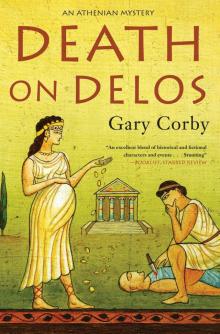 Death on Delos
Death on Delos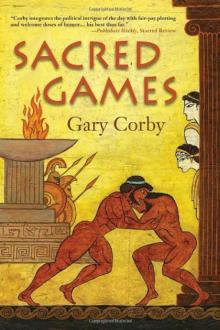 Sacred Games
Sacred Games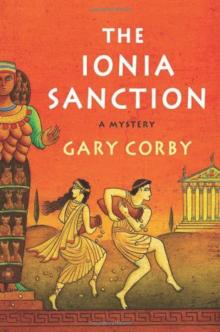 The Ionia Sanction
The Ionia Sanction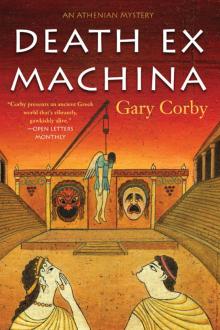 Death Ex Machina
Death Ex Machina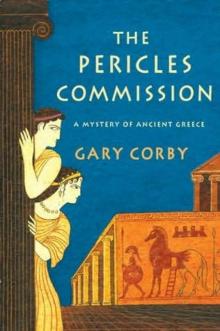 The Pericles Commission
The Pericles Commission